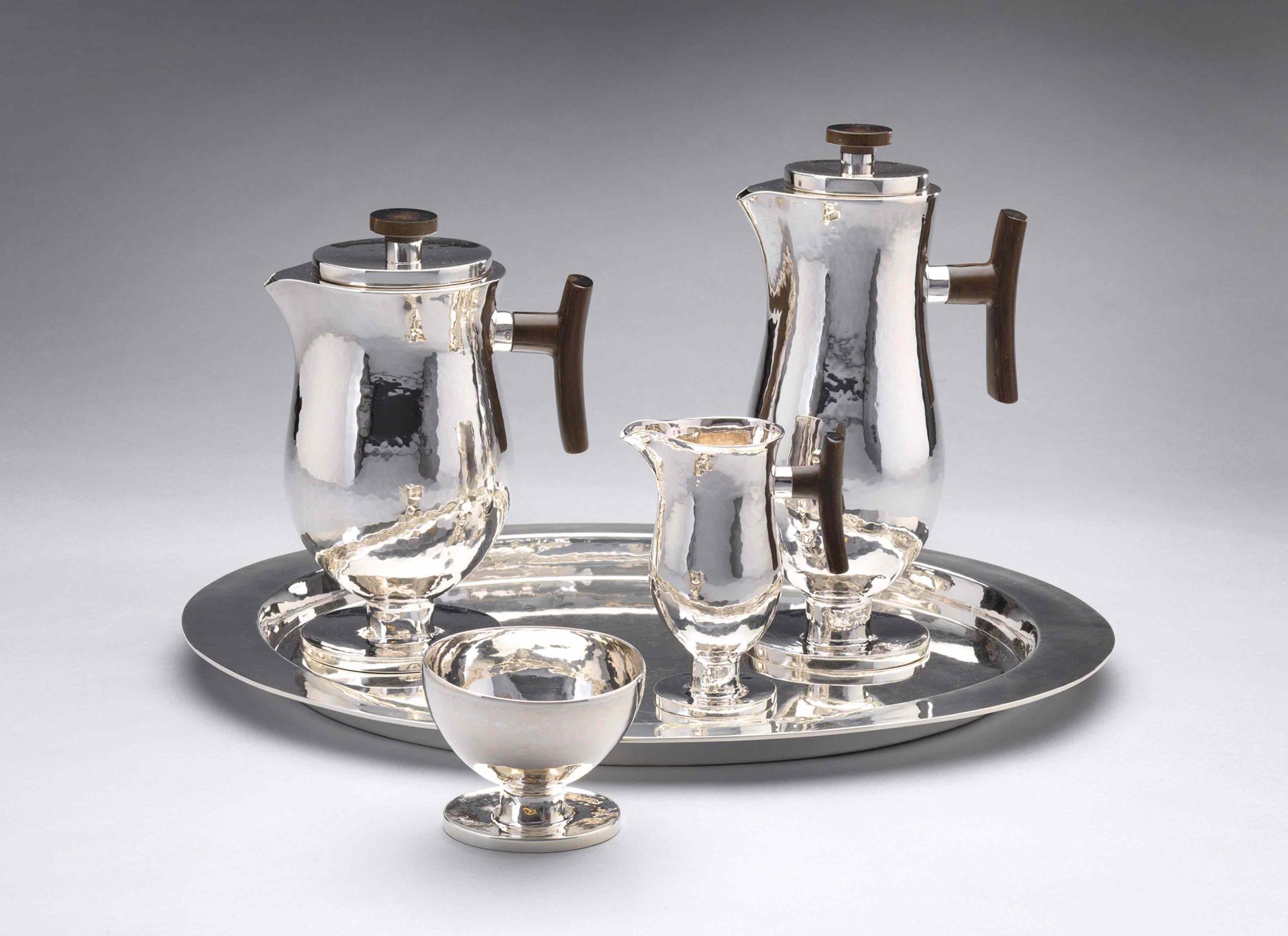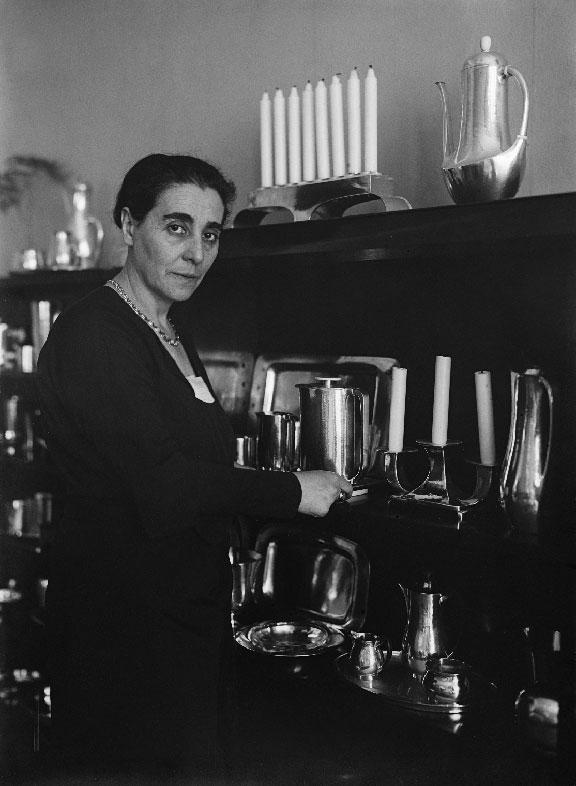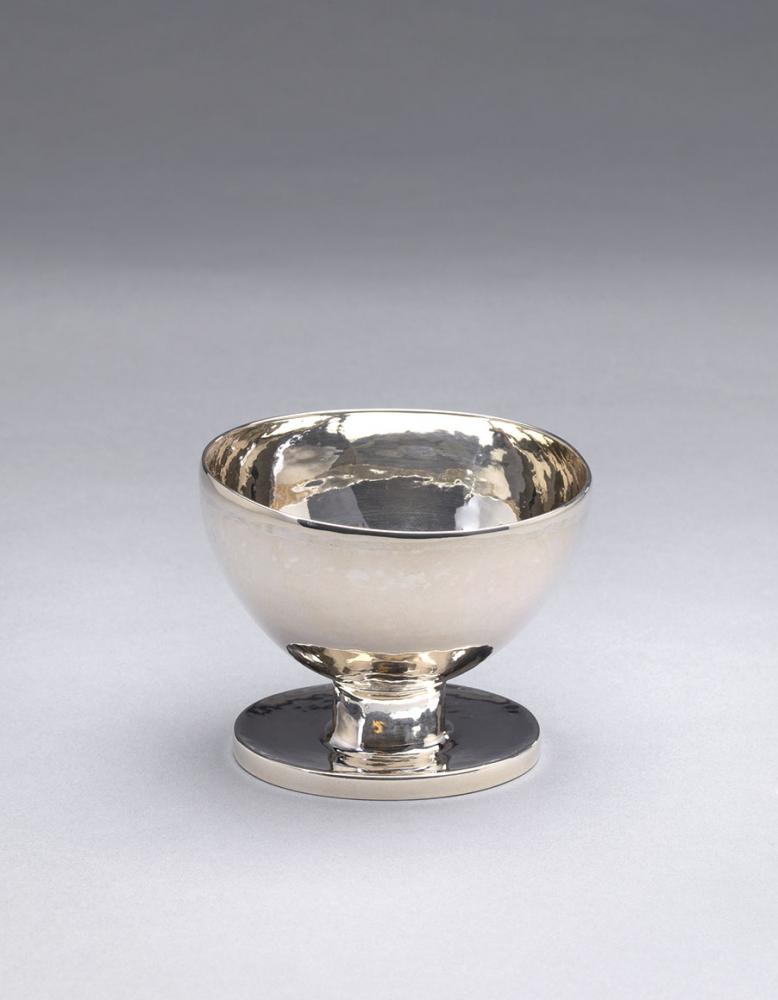“Well-balanced silver utilitarian objects that make you feel good”
Emmy Roth, Tea and Coffee Service, 1931, purchased 2010

Emmy Roth, tea and coffee service, 1931; Jewish Museum Berlin, accession 2010/143/0, photo: Jens Ziehe
Thinking back over two decades of collecting, a five-piece coffee and tea service comes to mind. It was made some eighty years ago in 1931. I imagine that it is hard for most people to get excited about teapots and creamers, but this service might just change your mind.
The best kitchenware designs, one can argue, are functional, comfortable to handle, easy to use and pleasing to the eye. This set has it all. Each piece can stand alone with strength and dignity and is a testament to its designer, the German silversmith Emmy Roth (1885–1942).
In the early twentieth century, women were still expected to remain within the confines of the “feminine” arts such as sewing, weaving and making lace. Women were denied admission to art academies and even after the progressive Bauhaus Academy had opened its doors in 1919, women were pushed into the fields of textiles, ceramics and book-binding.
It is therefore quite extraordinary that at the beginning of the century, Emmy Roth completed a grueling gold and silversmith apprenticeship at the firm of Conrad Anton Beumers in Düsseldorf, training at other workshops as well. Born in 1885, it seems likely that Roth was the first trained woman silversmith of the modern era in Germany.
Emmy Urias was the daughter of a Jewish department store owner in the small town of Hattingen. While her middle-class parents may have had certain expectations for her future, their strong-willed daughter had her professional training behind her by 1907-8, had married the first of her three husbands, and had opened her own workshop.
Finding her Own Style
Women who worked with precious metals in the early twentieth century tended to make jewelry, which does not have the same physical demands as hammering and soldering heavy metal sheets at high temperatures. In her early work, Roth also gravitated towards small ornamental pieces – combining silver with semi-precious stones, or working with delicate ivory. From at least 1920 until 1933, Roth established a workshop and showroom in the Charlottenburg district of Berlin and it is during this time that she found her own style, combining her high-level of craftsmanship with contemporary ideas of sleek, modern design.
The Jewish Museum’s tea and coffee service was made during this period, when Roth was at the peak of her silversmithing career. The silver elements of the service are all made of sterling and adroitly hammered by hand. As a lower quality silver alloy was typically used in Germany at the time, Roth’s use of sterling silver suggests that she could afford to work with expensive materials and had an eye on the international market, where higher quality sterling silver was preferred. The fact that the word “Germany” is stamped on the base reveals that the set was intended for export. It was a time when finely designed silver objects were in demand for the modern home and work commissions were essential for her business.
 X
X
Emmy Roth in her showroom, Berlin, 1932, bpk / Kunstbibliothek, SMB, Photothek Willy Römer / Willy Römer
Roth had a keen sense of marketing and knew the importance of publishing and exhibiting her work – regularly presenting her designs at the seasonal Grassi Fairs in Leipzig. Good marketing alone would not have been enough to sell her exclusive wares, but her unique design and silversmithing talents were recognized overseas, as well as at home.
Among her many exhibitions, Roth’s work was featured in the Woman’s National Exposition at the St Louis Coliseum in 1928 and in the groundbreaking Berlin exhibition die gestaltende Frau (literally: “The creating woman”) of 1930, which was the first exhibition to be organized by the German Association of Women citizens (Deutsche Staatsbürgerinnenverbandes e.V.). Held on the first floor of the Wertheim department store, the exhibition presented a select group of women painters, architects, photographers, applied artists, interior designers, and others. Emmy Roth was the only silversmith on exhibit and a five-piece silver service was given a full-page illustration in the accompanying catalogue.
Elegant Simplicity
At this time, Emmy Roth was designing Jewish ceremonial objects, as well as decorative housewares. Some of these designs were displayed in Berlin in the 1931 exhibition Kunst und Form which showcased contemporary Christian and Jewish ritual objects. For the twentieth anniversary of the Jewish Museum Berlin, we are fortunate to have both an Etrog box and a Kiddush cup, designed and made by Roth, on loan in our core exhibition. These are the only known ceremonial objects by Roth that, to date, are known to have survived.
Roth's innovative, functional pieces had an elegant simplicity, rejecting the florid ornamentation that was so popular in the late nineteenth century. As such, they were stylistically consistent with her secular work. But what indeed is so special about her work?
Returning to examine the coffee and tea service, one could extemporize on the graceful harmonious lines that are seamlessly created with technical virtuosity. However, I am always captured by both the thoughtfulness in the construction and the physical aspects, which we can no longer experience as the set is now out of use and preserved in the museum. Yet if we look more closely at the design, we are provided with clues. For example, the vessels have comfortable horn handles and one can deduce that they would not heat up and burn your hand if the pots were filled with boiling water. It is also evident that the pots were not made for a large hand size; they were designed by a woman, for a woman. If one had the good fortune to hold one of the vessels in the hand (wearing museum gloves, of course) I can reliably inform you that it would feel perfectly balanced and utterly gratifying.
A mention of Emmy’s work in the Jewish press of 1934 describes her “well-balanced silver utilitarian objects that make you feel good”
(“wohltuend”).1 And that’s just it. When a designer gets it right, as Emmy does, it is deeply soothing to look at or to hold their creations, and these are reasons to get excited about teapots.
Michal Friedlander, Curator of Judaica and Applied Arts
- CV Zeitung, Nr. 22, 2. Beiblatt, 31.5.1934 [278]↩︎
Citation recommendation:
Michal Friedlander (2021), “Well-balanced silver utilitarian objects that make you feel good” . Emmy Roth, Tea and Coffee Service, 1931, purchased 2010.
URL: www.jmberlin.de/en/node/8397


















